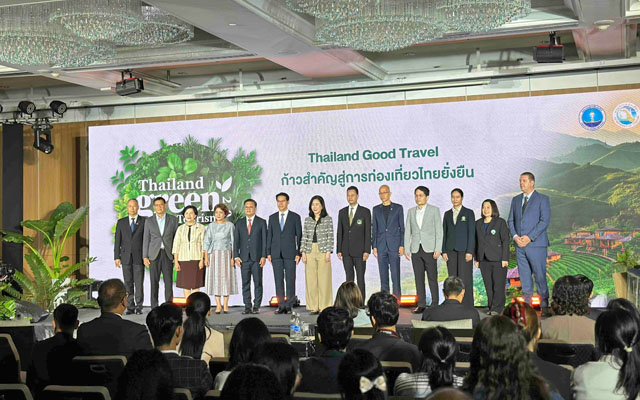Thailand’s Department of Tourism has officially launched the Thailand Green Tourism Plan 2030, positioning sustainability as the nation’s new tourism growth engine.
Under the theme Igniting the Path to Global Green Success, the initiative seeks to balance economic opportunity with environmental and cultural stewardship, while propelling Thai destinations into the Top 100 Green Destinations worldwide.

Presiding over the launch, Nattareeya Thaweewong, permanent secretary of the Ministry of Tourism and Sports, underlined the urgency of aligning Thai tourism with global expectations.
“Amid climate change, shifting consumer demands, and new European legislation, sustainable tourism is no longer an option but a mandate. By reducing carbon emissions 40 per cent by 2030 in line with Thailand’s Net Zero 2065 pledge, and embedding the 17 UN Sustainable Development Goals, we can maintain both our cultural identity and our competitiveness on the international stage,” she said.
The plan is anchored by a four-party MoU signed on August 6, 2025 between the Department of Tourism, Mahidol University International College (MUIC), Green Destinations Foundation, and Travelife for Tour Operators.
Together, they form STAC Thailand – the Sustainable Tourism Action Center, a hub to coach destinations, certify operators, and connect Thai tourism to international platforms, guided by Global Sustainable Tourism Council (GSTC) standards.
An additional 49 partners across the public, private, and academic sectors have pledged support.
The Department of Tourism also unveiled Thailand Good Travel, a sustainability standard and insignia designed for local communities, travel destinations, small accommodation of up to 50 rooms, and tour operators.
Built on GSTC principles but adapted for local realities, the standard provides a step-by-step pathway toward international recognition. Operators certified under Thailand Good Travel can integrate seamlessly through the Thailand Green Tourism Plan 2030 localised digital gateway which is integrated on the back end with Travelife’s global database of over 16,000 operators, giving them access to new distribution and partnership opportunities.
Kaewta Muangasame, who heads the MUIC-led STAC Thailand, added that the plan draws inspiration from established frameworks like Swisstainable (Switzerland), Singapore Green Plan, and Slovenia Green, while tailoring tools to Thai SMEs.
“Our role is to simplify international standards into language that product and operations managers can act on, and to make the standards recognised and desired by the local industry” she stated.
Kaewta also added that applications are now open for Thailand Green Coaches, a new cadre of trained mentors who will guide businesses in self-assessment and certification, for which 700 people have already applied.
Peter Richards, a sustainable tourism expert working with the MUIC team, observed:
“Travelife is more than just a certification – it’s a living platform of guides, resources, and peer learning. By creating a Travelife-integrated, localised digital gateway for Thailand, with certification checklists adapted to the local market through multiple in-person consultations with groups of local operators, we are making international standards accessible for SMEs. This step-by-step approach helps them join the global sustainability movement, and we hope it sets a benchmark for localising other international frameworks.”
“With the right coaching, half the journey is easy, and the other half achievable with consistent support,” he added.
The Thailand Green Tourism Plan 2030 is backed by budget allocations in FY2568 (2025/26) and is framed as part of Thailand’s Tourism Vision by the Ministry of Tourism and Sports which pivots from high volumes to high-value, high-yield tourism.

















